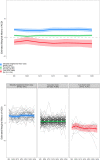Awareness of cognitive decline trajectories in asymptomatic individuals at risk for AD
- PMID: 33054821
- PMCID: PMC7557018
- DOI: 10.1186/s13195-020-00700-8
Awareness of cognitive decline trajectories in asymptomatic individuals at risk for AD
Abstract
Background: Lack of awareness of cognitive decline (ACD) is common in late-stage Alzheimer's disease (AD). Recent studies showed that ACD can also be reduced in the early stages.
Methods: We described different trends of evolution of ACD over 3 years in a cohort of memory-complainers and their association to amyloid burden and brain metabolism. We studied the impact of ACD at baseline on cognitive scores' evolution and the association between longitudinal changes in ACD and in cognitive score.
Results: 76.8% of subjects constantly had an accurate ACD (reference class). 18.95% showed a steadily heightened ACD and were comparable to those with accurate ACD in terms of demographic characteristics and AD biomarkers. 4.25% constantly showed low ACD, had significantly higher amyloid burden than the reference class, and were mostly men. We found no overall effect of baseline ACD on cognitive scores' evolution and no association between longitudinal changes in ACD and in cognitive scores.
Conclusions: ACD begins to decrease during the preclinical phase in a group of individuals, who are of great interest and need to be further characterized.
Trial registration: The present study was conducted as part of the INSIGHT-PreAD study. The identification number of INSIGHT-PreAD study (ID-RCB) is 2012-A01731-42.
Keywords: Amyloid; Awareness; Brain; Cognitive decline; Preclinical Alzheimer’s disease.
Conflict of interest statement
Federica Cacciamani reports no disclosures.
Luisa Sambati reports no disclosures.
Marion Houot reports no disclosures.
Marie-Odile Habert has received speaker honoraria from Lilly, GE Healthcare, and Piramal.
Bruno Dubois has received consultancy fees from Biogen, Boehringer Ingelheim, Eli Lilly, and MedAvante and grants for his institution from Merck, Pfizer, and Roche.
Stéphane Epelbaum reports receiving fees from Roche, Eli Lilly, Biogen, and GE Healthcare as a consultant or advisory board member.
Figures
References
-
- Lacerda I, Santos R, Belfort T, Neto JP, Dourado MCN. Patterns of discrepancies in different objects of awareness in mild and moderate Alzheimer’s disease. Aging Mental Health. 2018;26:1–8. - PubMed
-
- Tremont G, Alosco ML. Relationship between cognition and awareness of deficit in mild cognitive impairment. Int J Geriatr Psychiatry. 2011;26(3):299-306. 10.1002/gps.2529. - PubMed
-
- Senturk G, Bilgic B, Arslan AB, Bayram A, Hanagasi H, Gurvit H, Emre M. Cognitive and anatomical correlates of anosognosia in amnestic mild cognitive impairment and early-stage Alzheimer's disease. Int Psychogeriatr. 2017;29(2):293-302. 10.1017/S1041610216001812. - PubMed
-
- Therriault J, Ng KP, Pascoal TA, Mathotaarachchi S, Kang MS, Struyfs H, Shin M, Benedet AL, Walpola IC, Nair V, Gauthier S, Rosa-Neto P. Anosognosia predicts default mode network hypometabolism and clinical progression to dementia. Neurology. 2018;90:e932–e939. doi: 10.1212/WNL.0000000000005120. - DOI - PMC - PubMed
-
- Edmonds EC, Weigand AJ, Thomas KR, Eppig J, Delano-Wood L, Galasko DR, Salmon DP, Bondi MW. Increasing inaccuracy of self-reported subjective cognitive complaints over 24 months in empirically derived subtypes of mild cognitive impairment. J Int Neuropsychol Soc. 2018;24:842–853. doi: 10.1017/S1355617718000486. - DOI - PMC - PubMed
Publication types
MeSH terms
Substances
LinkOut - more resources
Full Text Sources
Medical




